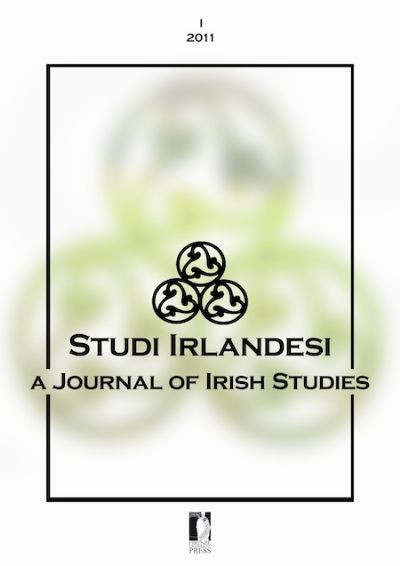November 10, 2021: extended deadline for submitting abstract proposals
The 12th issue of Studi irlandesi will explore the development of Digital Literature (DL) and Digital Humanities (DH) in Ireland, with particular reference to interpretations of the multiple ways in which Ireland has related to DL and DH in the past, and continues to do so in the present.Studies in DL and DH offer the opportunity to re-examine previous and new literary and cultural projects, while also exploring the interconnections of linguistics, literature and culture.
How has the turn to ‘digital’ been addressed in Ireland within literary, artistic, scholarly and publishing fields? In what ways has DH been practiced and developed in Ireland and in Irish Universities? What is the role that DH play in the study and teaching of Irish literature both in Ireland and abroad? How have issues of authorship and reading been modified in and by the digital environment? This issue aims to provide an overview of various computational and digital approaches to Irish literary, linguistic and cultural studies, as well as the various theoretical, epistemological, methodological and historical aspects of DH in Ireland.
It provides an occasion to showcase DH projects and/or methods that include digital tools in the interrogation of Irish Literature and Culture, and/or those which combine linguistics, literature and culture. Ultimately, the state of the art in the field of DH, in Ireland and/as elsewhere, also involves a rethinking of the places of production and the diffusion of (academic) knowledge, as well as the breaking of conceptual canons as they circulate and are (re)produced within cultural institutions, such as university.
Albeit proposals on the aforementioned topics are particularly welcome, contributions on any other aspect or area of DH will also be considered. The following is a non-exhaustive list of possible topics:
- Origins, contexts, poetics and projects of DL and DH
- e-Lit as a branch of DH
- Literary games and digital fiction
- Forms and modalities of “authorship” and “readership” in the digital environment
- Cognitive overload in the digital literary and humanities environments
- Didactics and pedagogy of DH and DL, and their place in academic curricula
- Programming skills and their role in DH
- The digital turn and divide
- Digital scholarly communication and publishing
- Politics and pedagogies of Open Access in Ireland
- Digital technologies for cultural heritage
- Digital archives, with reference also to archiving/collecting online as coalition-building (with particular reference to intersectional, anticolonial, and decolonial approaches to class, gender, race/ethnicity, sexualities, ability)
- Automatic text analysis, stylometry, attribution studies, natural language processing and computational linguistics, digital philology and textual studies
- Data analysis, data mining, databases, visualisation, and text archiving
- Digital and computational approaches in archaeology, architecture and art history, image processing, 3D modelling and digital restoration
- Hacker culture and digital activism
- Student (dis)engagement and the turn to digital: experiences from the field pre-, during- and post- COVID-19 pandemic
Contributors are invited to present literary, theoretical/methodological essays, case-studies, videos and reviews of books, online projects, tools and datasets to the Guest Editors.
Studi irlandesi. A Journal of Irish Studies is a peer-reviewed, open-access journal published by Florence University Press. It aims to promote and contribute to the interdisciplinary debate on themes and research issues on every aspect of Irish culture, to create a place for international discussion and high-quality research on Irish literary studies, history, cultural perspectives and linguistic inquiry, from the Romantic Era to the present age. This issue will be published in English.
Articles are subject to full double-blind peer review.
Please send abstracts of 250 to 400 words, outlines and expressions of interest for papers of 8,000 to 10,000 words, as well as biographic information of 50 to 100 words by 10 November 2021 to the Guest Editors, Arianna Antonielli (arianna.antonielli@unifi.it) and Samuele Grassi (samuele.grassi@unifi.it), in addition to the General Editor, Fiorenzo Fantaccini (ffantaccini@unifi.it).
Successful candidates will be informed by mid November 2021.
The deadline for submission of manuscripts is 15/20 February 2022.Informal enquiries about possible paper submissions are welcome and should be addressed to the contacts above.
The 12th issue of Studi irlandesi. A Journal of Irish Studies will be published in June 2022.
You can download the PDF of the call here.

